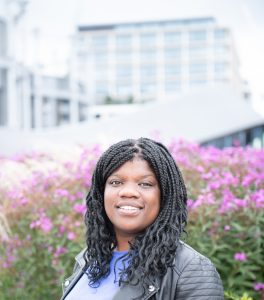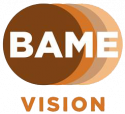
“I don’t always need somebody to help me, I’m quite independent” – Anita Barzey
At BAME Vision, we are celebrating Blind and Partially Sighted mothers from ethnic minorities, with the aim of contributing to the diverse representation of the vision-impaired community. In this series, we are looking to shine a light on mothers who work or volunteer, as we find out more about this largely unreported part of society. We will discuss motherhood, culture, mental health, support systems, self-confidence, and everything else in between.
Anita, our second guest is a vision-impaired mum from an African-Caribbean background. She is the mother of two children, Isaiah who is 6 and Maya who is 4 years old. Anita’s sight impairment is caused by Intracranial Hypertension (IH), which is a build-up of pressure around the brain. This then put pressure on her optic nerve, thus affecting her eyesight and Anita has lived with this condition since childhood.
How would you describe yourself?
I am very open-minded. I love life and try to enjoy life as much as I can. An adventure-seeker, who loves to meet new people, I think I would say that I am very friendly! I wouldn’t say skydiving, but I’m the sort of person who would book a holiday tomorrow and go!
So, culturally, do you feel that people expect something different from you as a vision-impaired mum?
I think there is a stereotype, I’m a single parent. A comment was made, maybe they did not mean it in a bad way, about trying to make the relationship with my children’s dad work, because I’ll need extra support in case my sight gets worse.
I was taken aback, but at the same time, I felt that I couldn’t blame the person for having those thoughts. It’s not just a cultural thing, it’s societal. The assumption is that because I’ve got this sight loss, I always need somebody to be there, but I don’t. I’m very independent.
What is your favourite blind mum hack?
Because I have a bit of useful sight, I try to buy my children brightly coloured coats. I find it really stressful going to the park, so putting them in brightly coloured coats makes it easier for me to find them, and if I’m describing them to somebody they would stand out. It has been a godsend.
Be honest with your children, from when they are little. Telling them you can’t see, that they should always make sure they can see mummy.
The other tip is, when your children are younger, I used to place their clothes in baskets and label them according to size. So, it would be 0 to 3 months, 3 to 6 months and so on. It made it easier for me, I didn’t have to worry about looking for clothes, I just pulled them out of a basket!
Do you have a Mother’s Day tradition?
From the age of around 10 or 11 I used to go to the flower market and get fresh flowers for my mum. Now, I place the order online, as things have changed due to the pandemic.
What would you like to say to other blind mums from ethnic minorities out there, and what would your advice be?
You know yourself best, you know your child best. Sometimes people will have things to say to you, it’s their opinions and that’s all they are. You need to find your way, and your pace and you’re going to do things with your children. Everyone will have something to say, but you decide what you do and don’t listen to.
Also, just remember you can have bad days, everyone has bad days. Sighted parents have bad days, and that’s okay. It’s okay to have those days.
We will talk about this in more detail in the next interview, so could you briefly tell me what you like most about being a working mum who is also vision impaired?
I love the fact that my children recognise that I have more than one role. Sometimes when you become a parent, you lose yourself a little bit. Obviously to be a mum is a very big role, and I like the fact that I can be Anita. I get the space to be me, especially at work, and I like that.
Be sure to tune in for part two, where Anita will be joining us to discuss more about her work life, the challenges she has faced, and the services she has accessed to support her in employment.
Written by Sylvia Chengo – BAME Vision
